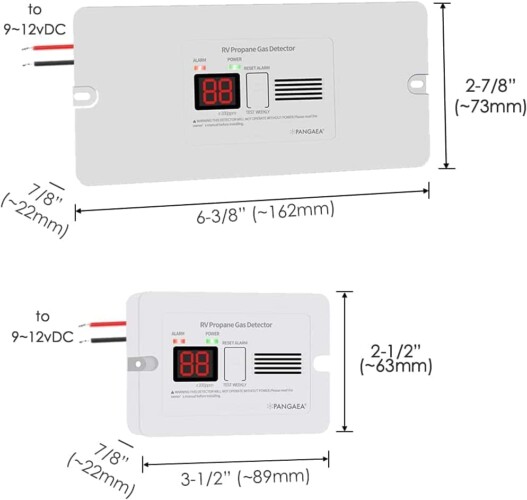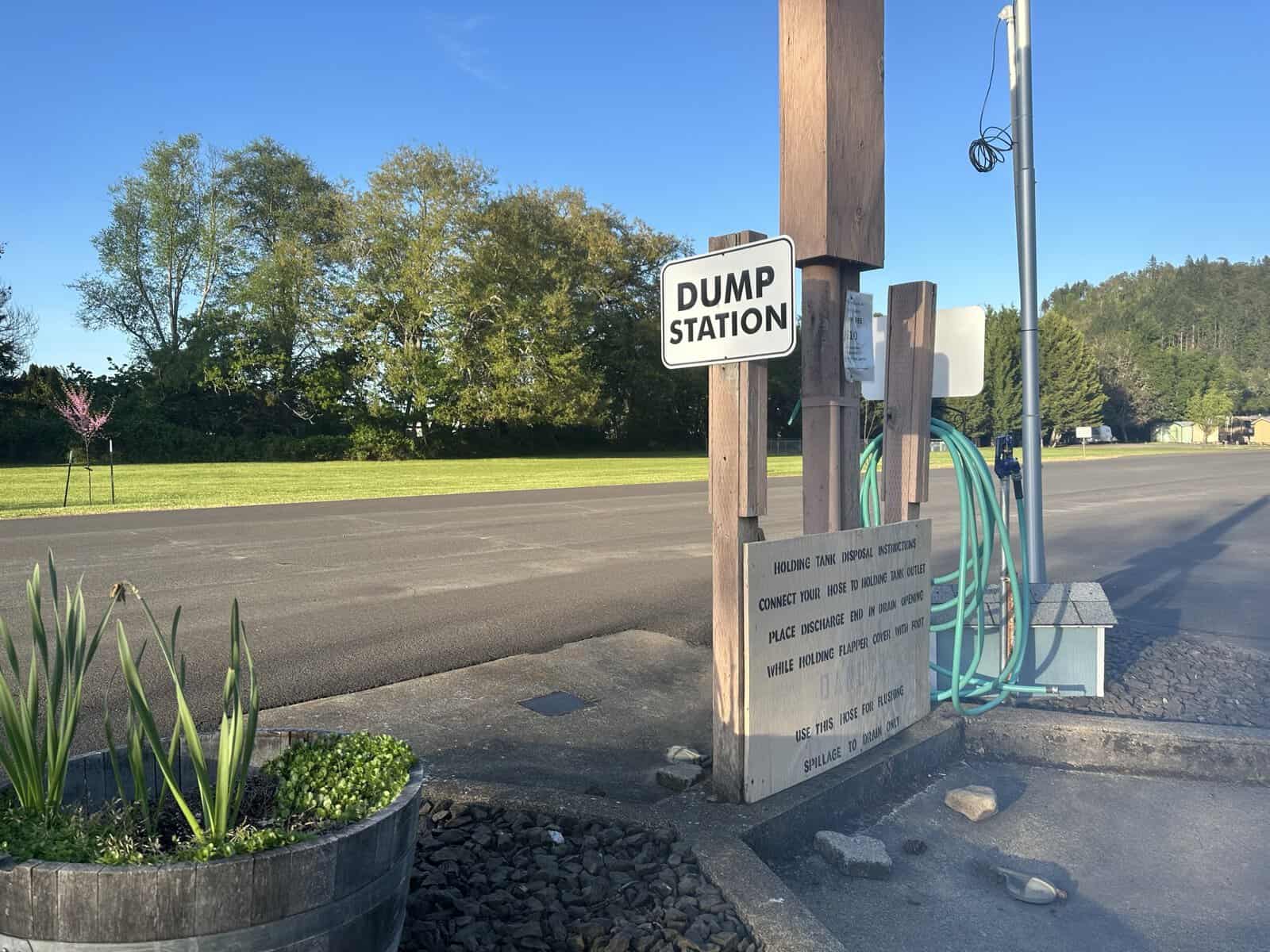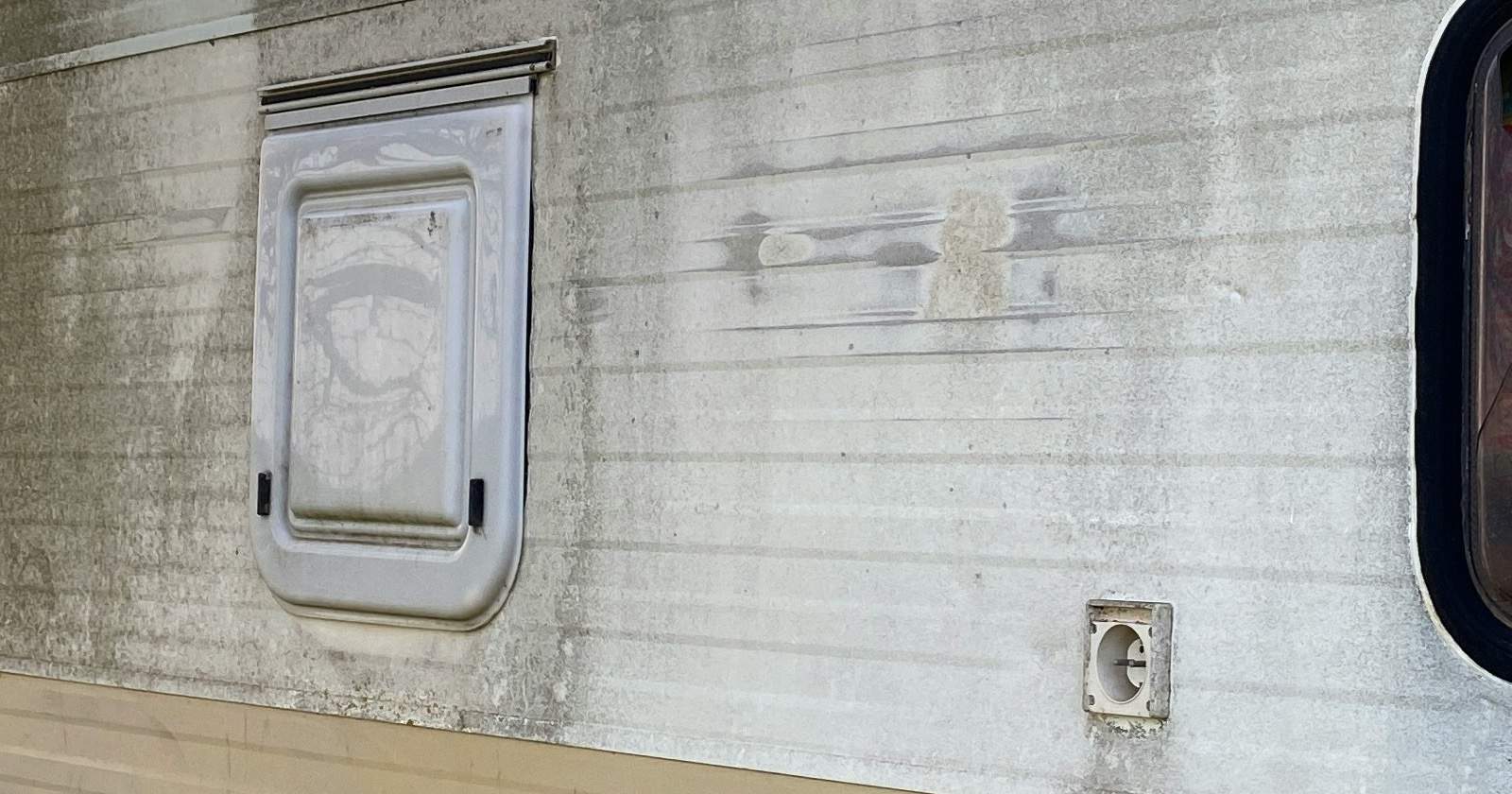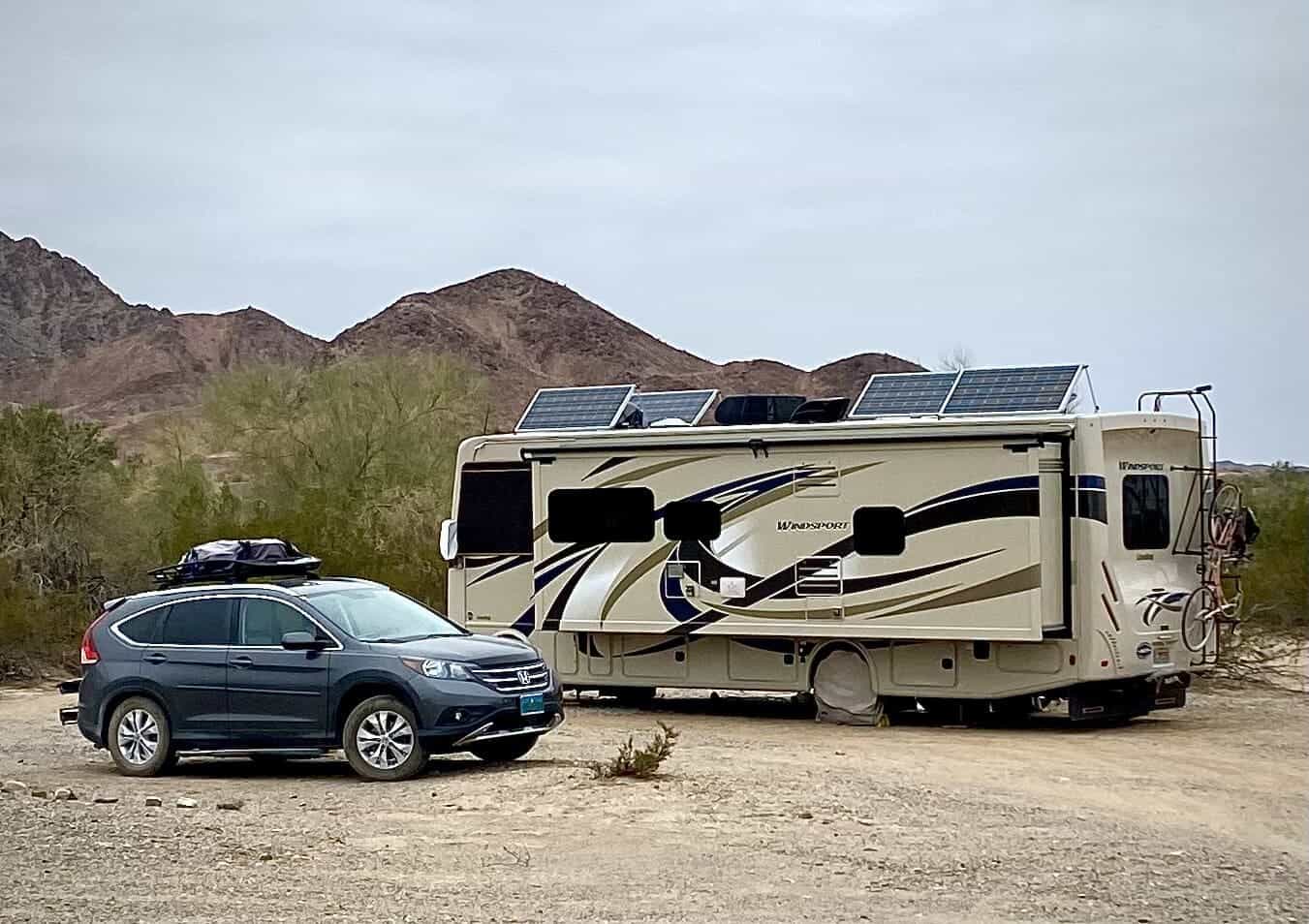We have more cool electronics and camping gadgets than ever before.
But without knowing how to save power when dry camping in an RV, those devices are pretty useless.
Thankfully, learning off-grid power conservation methods is as easy as looking to the past.
In this article, you will learn how to save power while dry camping. Then you can enjoy the freedom of RVing without hookups.
You’ll use your RV just like how the old-time RVers (maybe even your grandparents!) used theirs.
RVs Once Had Far Less Power Needs
This might seem foreign if you took up RVing in recent years. But there was once a time, before the term “RV” was coined, when trailers and campers required little, if any, power.
What little power was required was supplied by a single 12-volt battery. Here’s what RV power used to look like:
*Learn more about vintage compressed air water tanks.
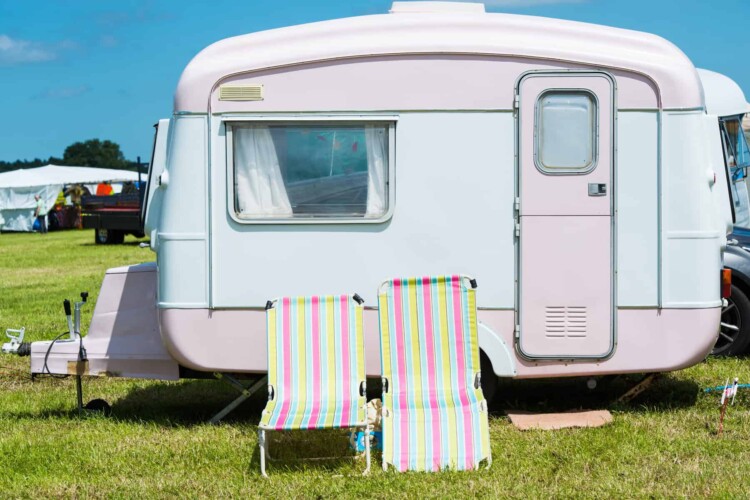
Back then, you could literally camp for weeks without hooking up to shore power.
You didn’t worry about depleting your house battery, either. In fact, shore power was a rarity when trailer camping in your grandparent’s day. Most campgrounds were off grid with no hookups of any kind.
Shore power was only found in trailer parks where people lived full time in “trailer homes.”
Our Grandparents Knew the Best Ways to Save Power When Boondocking
Today you can learn much on how to save power when dry camping. Just look back at how grandma and grandpa camped, say 60 years ago.
First, ditch the 120-volt appliances.
Going without 120-volt appliances is the easiest way to save power when dry camping. Most are power hungry. With no shore power available when dry camping, you must rely on a generator or inverter system. But otherwise, there is no way to readily power RV appliances. The way to get around this is to look for non-electric RV appliance substitutes.
Let’s look at some alternatives for common 120-volt RV appliances by looking how grandma and grandpa “survived” in their camper.
120-volt RV Appliances and their Alternatives for Boondocking
Microwave
Most anything that can be heated or cooked in a microwave can also be heated or cooked outside of it. Turn to your RV range, campfire or camp stove. Cooking outside is half the fun of camping so try cooking over the campfire. Listening to the campfire pop and snap is much more enjoyable than listening to the generator powering the microwave.
Air Conditioner
Take advantage of natural cooling features that create air conditioner alternatives. For example, try parking in the shade, letting prevailing winds blow through your RV. Go camping at higher altitudes. Or try camping next to large bodies of water.
Coffee Maker
Instead of an electric coffee maker, try a stove top percolator. Relive how grandpa and grandma made coffee! Or for RVers with more refined tastebuds, check out the Aeropress Coffee and Espresso Maker.
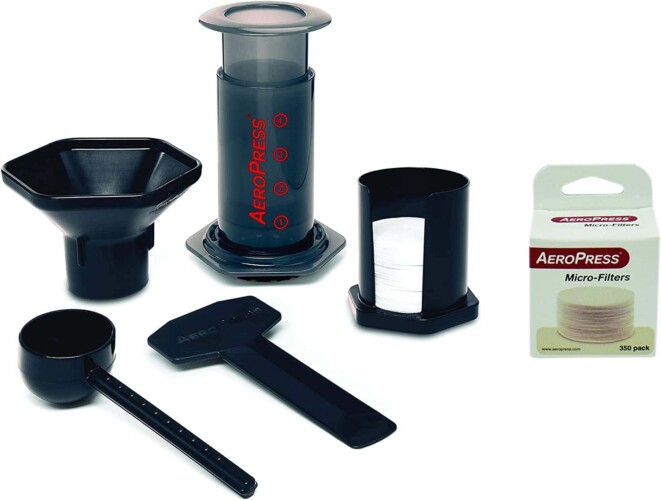
Toaster
Brown your morning English muffin under the oven broiler or use a stove top toaster.
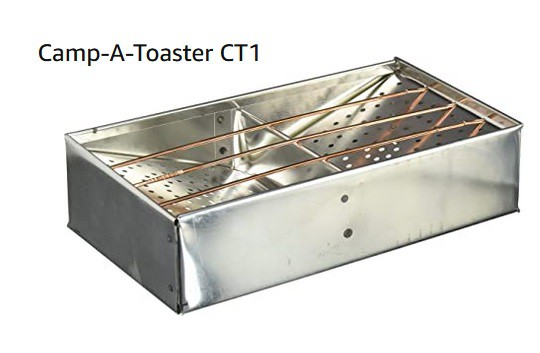
Television
Enjoy the best live show ever! Go outside and enjoy nature during the day. Take in the stars at night, like grandma and grandpa did.
Reduce 12-volt Power Usage
Let’s look at other ways you can reduce power when dry camping.
Lights
- If your RV didn’t come equipped with LED lights, change out the incandescent bulbs. Upgrade to LED RV lights. LEDs consume just a fraction of 12-volt power that incandescent bulbs devour.
- Turn off lights when not needed.
- Consider alternative light sources for camping. Try a head lamp for reading or stick-up LED lights in areas where full ceiling lighting is not required.
- Leave the porch light off at night. If you feel the need to light up the exterior of your campsite, consider solar yard lights. Another option is to install wall mounted propane lights (lanterns) like the camp trailers of old.
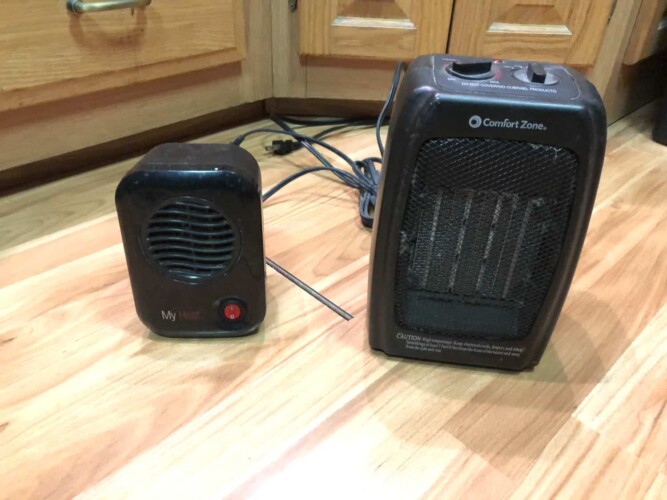
Heat
The forced air furnace found in most RVs suck a lot of 12-volt power from your RV house battery when in use.
Did you know you can stay warm without electricity in an RV?
Consider an alternative heat source like a catalytic safety heater or a radiant ceramic heater. Learn more about these alternative RV heat sources here. Always follow the manufacturers safety instructions.
Bake something! Your RV oven is not approved for comfort heating. But, it does a great job of heating the interior of an RV when you make something tasty.
Instead of an electric crock pot, plan a slow roasted dinner in the oven on cool nights. You will find your furnace runs less, and sometimes not at all. Slow bake cookies baked in the oven are a nice treat before bed. Plus, they will warm your tummy and the RV before turning in for the night. After enjoying your cookies, leave the RV furnace thermostat set to the lowest setting. Crawl into bed pulling heavy comforters over you for an enjoyable night’s sleep with minimal furnace run time.
So you’ve decided to try boondocking, and like many before you, one of your first questions is “How long will my battery last boondocking?” It’s a pretty straightforward question, but the answer is relatively individualized to your RV and setup.
How Long Will My RV Battery Last While Boondocking?
Slay Parasitic & Phantom loads
Take the time to understand how and where your RV uses 12-volt power.
We know running the ceiling lights and furnace draws down the house battery. But what about all those things you can’t see or hear? The LP gas detector, entertainment center display, command center lights, etc. constantly draw amperage out of a house battery when left on.
To determine the amp draw of phantom loads:
- Grab a volt-ohm meter in your 12-volt DC test kit.
- Then pull the fuse for each circuit in the converter.
- Next, measure the amp draw between the fuse terminals with your volt-ohm meter.
Be careful though! Most volt-ohm meters can only measure up to 10 amps without incurring damage. Therefore, don’t test the ceiling light circuits with all the lights on or the furnace while running, etc.
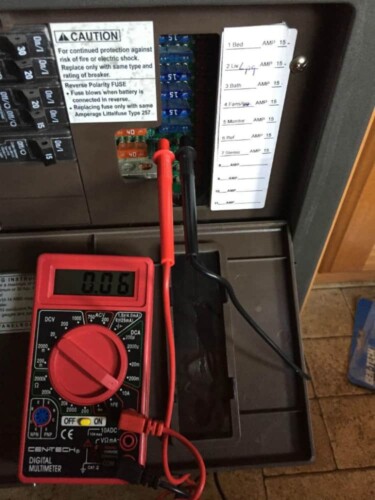
Why you need to special attention to the amp draw of your RV refrigerator.
Many Dometic refrigerators have a heat strip in the door frame at the top of the refrigerator section. This is intended to reduce the formation of condensation and wetting the seal. However, the strip draws 1 amp per hour out of your house battery when the refrigerator is turned on. That’s 24-amps per day or one half the usable reserve capacity of a typical deep cycle battery!
Some Dometic refrigerators a hidden switch allowing you to disable this feature. Other options are to disconnect it or install your own switch.
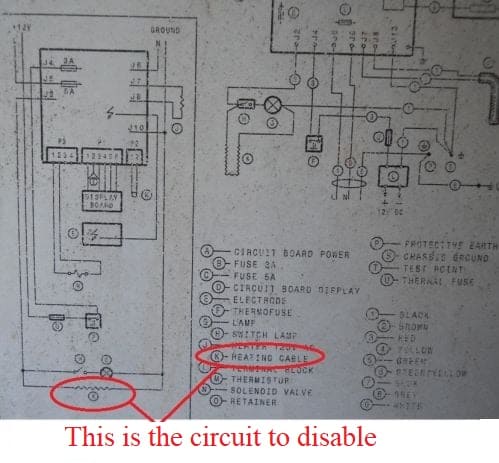
Some Norcold refrigerators are equipped with a cold weather kit designed to keep the refrigerator operating normally in sub-freezing weather.
The heat strip activates when temperatures drop below 40° F drawing 2-amps per hour from your house battery. This adds up to 48-amps per day. Or, virtually the whole usable reserve capacity of a typical deep cycle battery!
Learn more about absorption refrigerator cold weather operation.
What about 12-volt compressor refrigerators?
Residential RV refrigerators are becoming more common. Some manufacturers are even including them in the latest models.
The only problem? These refrigerators require the reserve capacity of a standard deep cycle battery per day! A residential RV refrigerator is not great for dry camping. There is little you can do with them to save power when dry camping.

Now that you understand where the precious power is flowing from your house battery(s), you can take steps to minimize or eliminate the loads. This allows you to save even more power when dry camping.
Since the LP gas detector is a required safety item you won’t want to eliminate it. But you might trade it out for a better, energy saving LP gas detector.
Other ways to conserve and save power when dry camping
- Turn the water heater off at night. This appliance doesn’t pull much in the way of 12-volt power. But turning the water heater off at night will keep it from cycling all night and needlessly consuming 12-volt power.
- Limit charging devices like cell phones, laptops and tablets. Consider using a car charger instead. Recharge these devices from the tow vehicle or dinghy’s alternator while you’re out exploring for the day.
With just a little planning and practice you can quickly learn how to save power when dry camping. Grandma and grandpa will be smiling down from above as you enjoy the freedom of off-grid camping, just as they once did.

